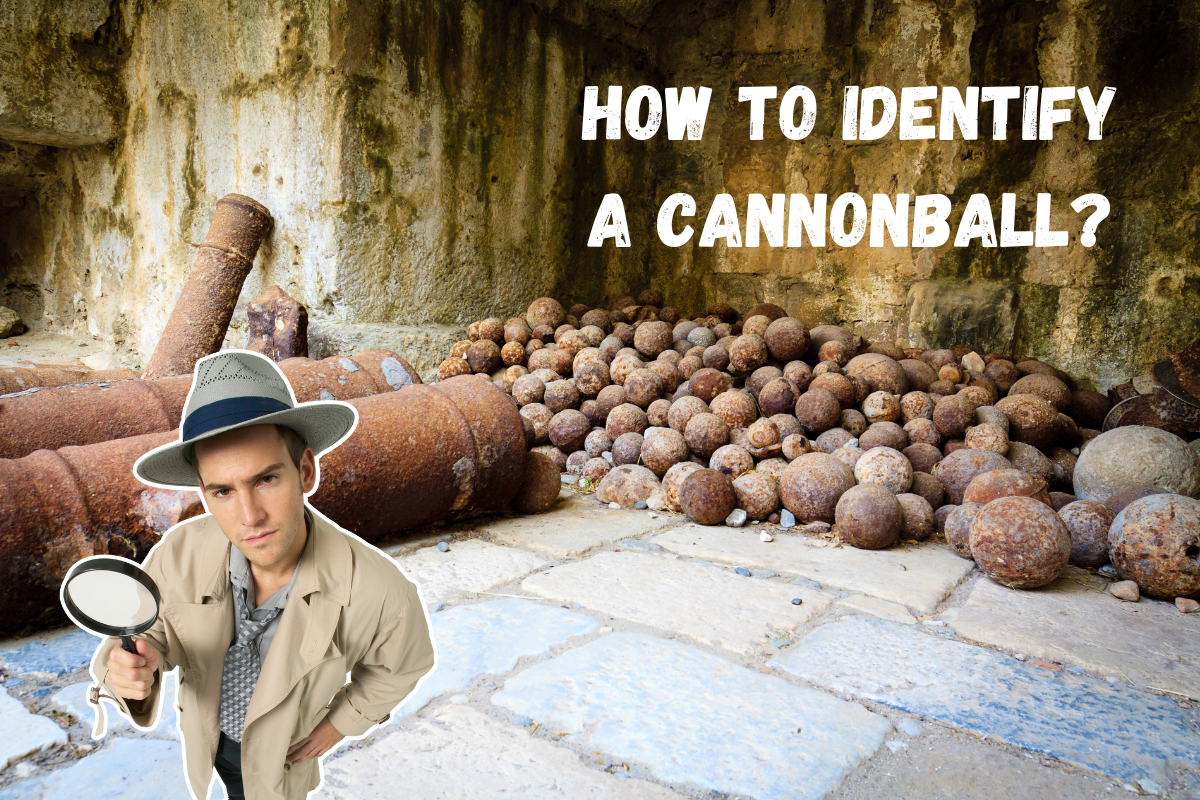Gold! The ultimate prize every treasure hunter hopes to find.
No matter your experience with metal detectors, or if you’re strictly a gold panning enthusiast, you always try to improve your craft and claim a bounty.
While I’ve dabbled in panning and enjoy it, my passion lies in metal detecting.
So if you’re looking for all the answers to your questions about metal detecting for gold, welcome.
I’ve got all the facts for you, from the best frequency for gold to knowing where to find it.
Let’s jump right in so you can get back on the hunt.
Can Gold Be Detected by A Metal Detector?
Yes, gold can be detected by a metal detector because it’s easily one of the more conductive metals a metal detector can pick up, though not the best.
But not all gold is created equal.
Other metals may be mixed in depending on the type of karat. And the higher the karat, the more pure the gold is.
So, if you’re looking for 24 karats, the purest form of gold, your metal detector is up to the task.

The more difficult job is when those other metals lower the karat quality and affect the conductive properties your metal detector relies on.
If you’re unfamiliar with the electrically conductive effects of metal and what it has to do with a metal detector, I suggest brushing up on how your metal detector works.
Of course, you’ll experience other environmental factors that make gold set off a metal detector more challenging, but that’s all part of the dirt fishing experience.
For now, let me share with you what I’ve learned about the types of gold and how to detect gold underground.
First up, we’ll tackle the best metal detector frequency for gold.
What Frequency Is Gold on A Metal Detector?
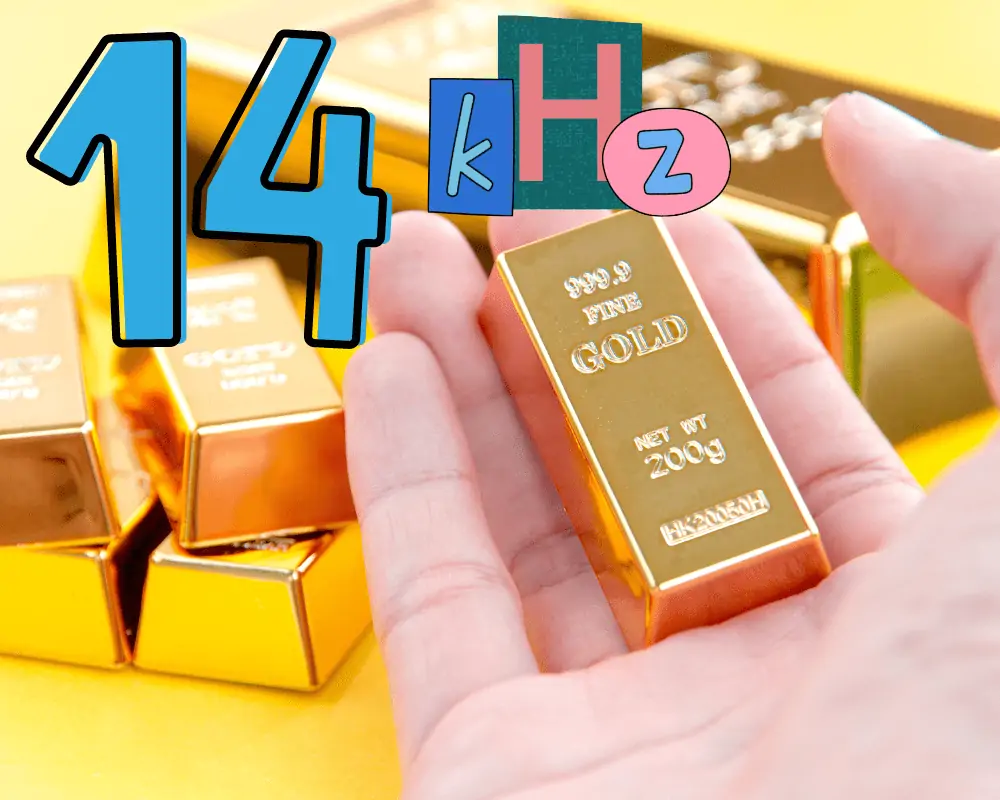
The metal detector frequency best for gold is 14 kHz or higher.
While lower frequency metal detectors are better suited for the most highly conductive metals, like silver and copper, gold is just a good conductor of electricity.
That, combined with the fact that it’s usually found in smaller sizes, makes a higher frequency metal detector best for detecting gold.
What Frequency Metal Detector Is Best for Gold?
When I say that a frequency of 14 kHz or higher is needed to find gold, I should also clarify that there are different metal detector types capable of finding gold.
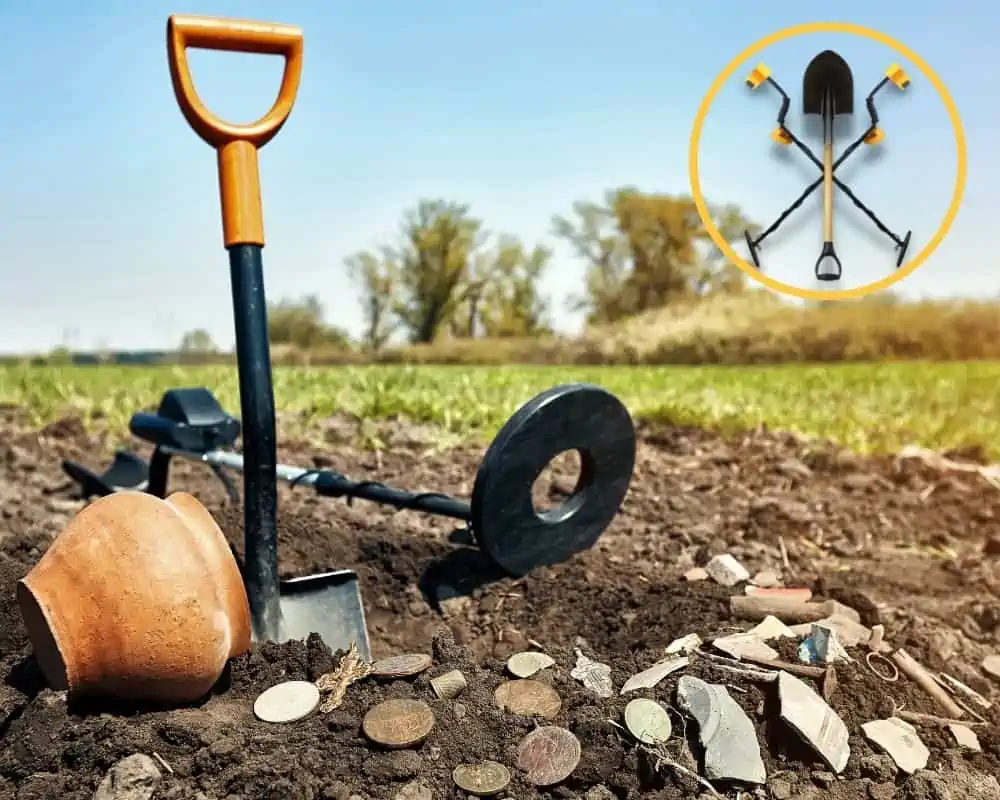
The two most popular frequency metal detectors for gold are a VLF (Very-Low Frequency) and PI (Pulse Induction).
Both have their pros and cons, but a VLF frequency metal detector is best to find gold for beginners.
VLF Metal Detector Frequency for Gold
VLF detectors have two coils: the transmitter coil and the receiver coil. The transmitter coil creates a magnetic field in the soil, while the receiver coil picks up the detection of gold from its responding magnetic field.
A VLF metal detector is top-notch when finding small flakes to larger gold nuggets underground.
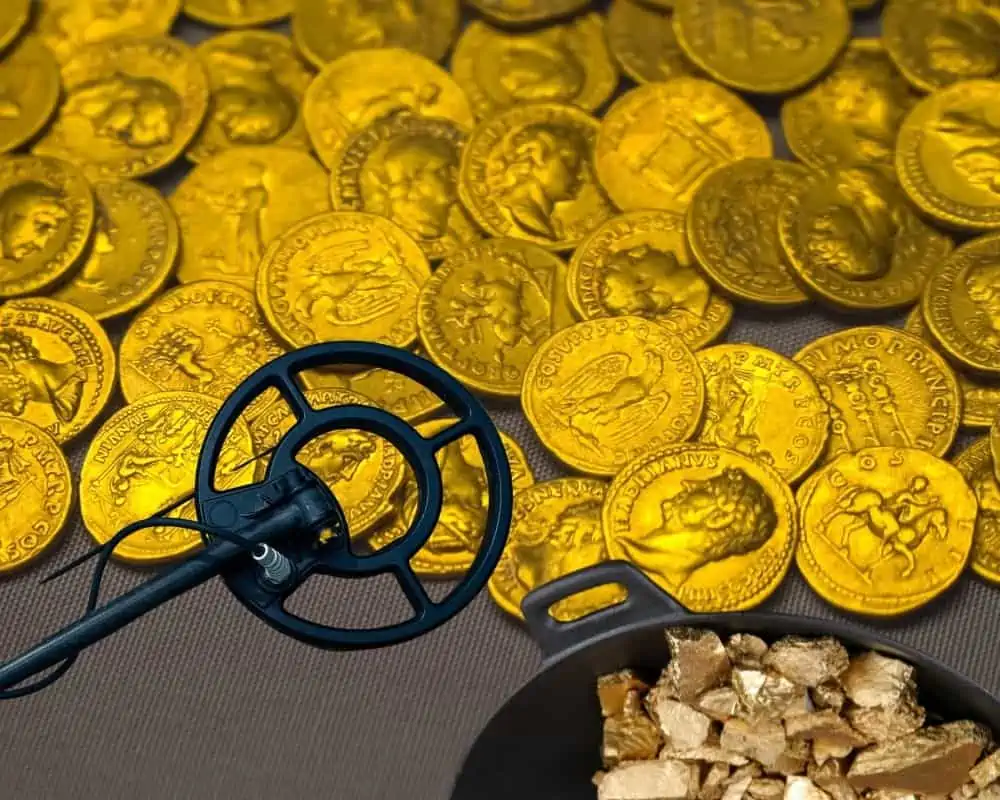
However, one of the drawbacks is the creation of false positives generated by highly mineralized soil.
And if you didn’t know, most gold will be found in these mineral-rich areas.
Solving that problem is usually easy, as long as your gold detector has the required discrimination features.
PI Metal Detector Frequency for Gold
As for PI frequency metal detectors, you’ll want to use these if the gold you seek is deeper underground.
They work by sending out pulses of electricity that penetrate deep into the soil. These pulses create a magnetic field, which any gold in the area will disrupt. While the added depth can’t be ignored, there are some obvious deficiencies.

For starters, the price.
Look, you get what you pay for. But pulse induction should be your go-to option if you’re serious about metal detecting for gold without limitations.
The other disadvantage is the experience level needed for this type of gold-frequency metal detector.
Discrimination performance isn’t as robust as a VLF device. Or I should say, it takes a more practiced hand to distinguish the difference between detecting gold versus other metals like aluminum or iron.
Do All Metal Detectors Detect Gold?
Despite the benefits of the VLF and PI metal detectors, all metal detectors can detect gold.
Again, this comes back to the frequency and other advanced features built into your metal detector.

Most single coil metal detectors come with just one frequency available. If that frequency maxes out below 10 kHz, your chances of detecting gold in soil are not very likely.
But not impossible.
Your metal detector should pick up gold signals if the gold is just below the surface.
There are also newer metal detectors using multi-frequency technology.
Multi-Frequency (MI) metal detectors can switch between different frequencies designed to adjust to the metal target and varying soil conditions.
You can’t go wrong with all the options available to you. But meeting that 14 kHz threshold is crucial.
If you’re looking for the best metal detectors on the market for finding gold, be sure to check out my review of the top 6 models.
Can Metal Detectors Detect Only Gold?
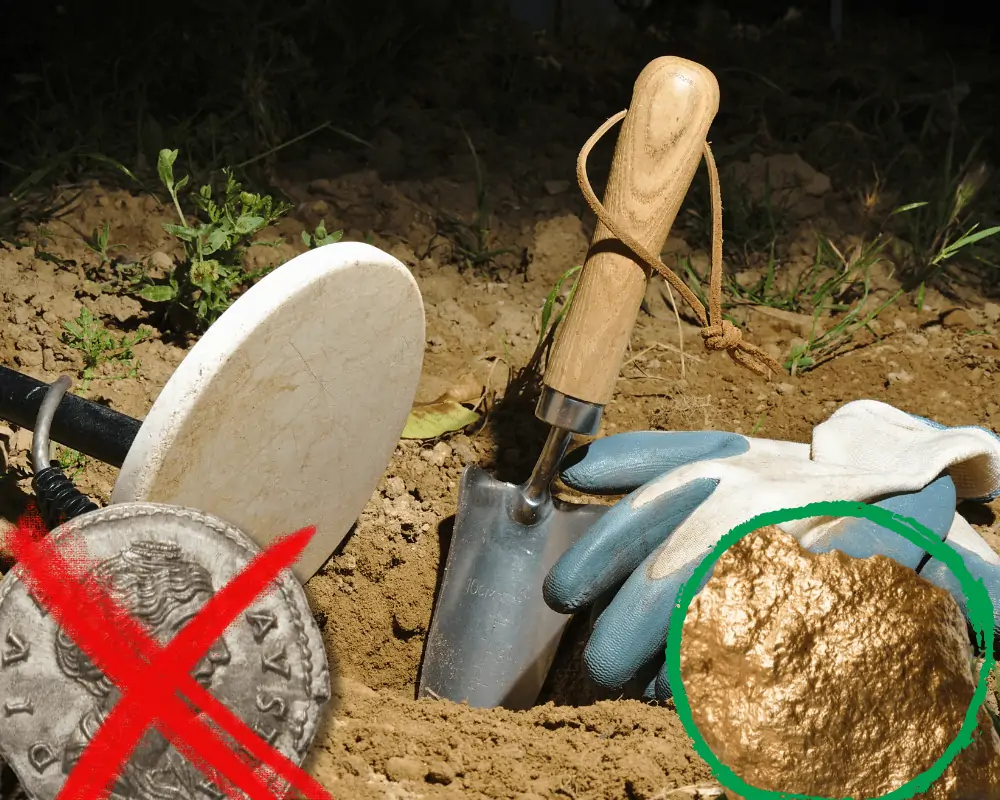
I have a secret for you if you want to know how to detect gold underground with a metal detector just for gold.
Ready?
There is no such thing as a metal detector just for gold.
The reason is that the gold making your metal detector go off could be pure gold nuggets or an alloy made into gold jewelry.
There isn’t just one type of gold; thus, you want your metal detector to pick up all metal variations.
But that doesn’t mean there aren’t detectors made specifically with gold targets in mind.
How Deep Do You Have to Dig to Find Gold?
So you want to know how far can a metal detector detect gold?
The depth you can detect and dig up gold will depend on the gold’s size, the soil conditions, the type of metal detector, and the user’s experience.
On average, your metal detector can detect gold up to 12 inches. But with the right equipment, you could dig up gold as far as 40 feet underground.

Gold nuggets are generally easier to find than gold flakes because they are bigger and have a higher conductivity. This means they’re more likely to disrupt the metal detector’s magnetic field, making them easier to detect.
Smaller gold pieces may become a problem when hunting in trashy areas.
Mineralized soil can make it more problematic to find gold because it disrupts the metal detector’s signal.
So, if you are treasure hunting in an area with a lot of mineralization, it’s crucial to have a metal detector designed for that purpose.
Most professional gold diggers will carry multiple coils to help offset the effects of mineralization.
As for your experience level playing a role?
The more you practice, the better you’ll become at using your metal detector to find gold deep underground.
If you’re relatively new to the life of a Digger, I’d recommend setting up a simple test garden for yourself before venturing out to better places.

Try burying different metals (including gold) to varying depths in your yard and see how deep your metal detector can pick up on them.
Be sure to map it out and fence it off, or just use some rocks to mark the borders of your test area.
You don’t want to lose anything valuable.
Trust me; it really does help. A pull tab can sound like a gold nugget when you’re first starting out.
You’ll be an expert gold hunter with a bit of practice in no time!
Gold Karat Detector: The Different Types of Gold
I think you’ve got the gist of metal detector technology when finding gold.
Now, you need to know what kinds of gold there are so you know what to look for.
There are 4 different gold karat categories; pure gold, yellow gold, colored gold, and gold plated.

While most beginner detectorists ask, will a metal detector detect gold, you should consider the gold quality you hope to find.
So let’s dig in.
Pure Gold: Does 24k Gold Set Off Metal Detectors?
First, let’s clear the air and clear up some of the myths out there I’ve seen.
24k gold will set off metal detectors. Some older metal detectors, like magnetometers, detect only ferrous metals, not gold.
But these are primarily used in airports, and even those have been mostly replaced with imaging technology.
Pure gold is gold that is 24k (karats) or higher.
Anything below 24 karats is not pure gold. To be considered pure gold, there should be no other metals in the metal makeup.

While it is the most valuable type of gold, it’s also the rarest to find. Most gold found, especially gold nuggets will be a lower karat.
The average person doesn’t usually know that gold is quite fragile in its purest form. It’s often too soft to wear as jewelry or use in other applications, which is why it’s frequently mixed with other metals to create an alloy. In fact, you’d have no problem scratching the surface of pure gold with a fingernail. So be careful!
Yellow Gold
Yellow gold has been mixed with other metals, typically copper and silver, to create an alloy.
Adding these other metals gives the gold more strength and durability, so it can be used in jewelry and coins without being too soft or fragile.
The karat system is still used to measure the purity of yellow gold, and because it’s an alloy, it will always be less than 24 karats.
The most common form of yellow gold is 18 karats, about 75% gold.
Colored Gold

Colored gold is similar to yellow gold as it has been mixed with other metals to create an alloy, but in this case, the other metals are added deliberately to create a specific color.
The most common colors of this type of gold are rose, white, and sometimes green.
Because different metals are used to create different colors, the purity of colored gold can range widely. For example, green gold is often 50-85% gold, while white gold is usually only 50-75% gold.
Gold Plated: Will Gold Plated Jewelry Set Off a Metal Detector?
Gold plating is a process where a thin layer of gold is applied to another metal, typically brass or copper.
Because copper and the other metals in gold plated jewelry are highly conductive, it will always set off a metal detector.
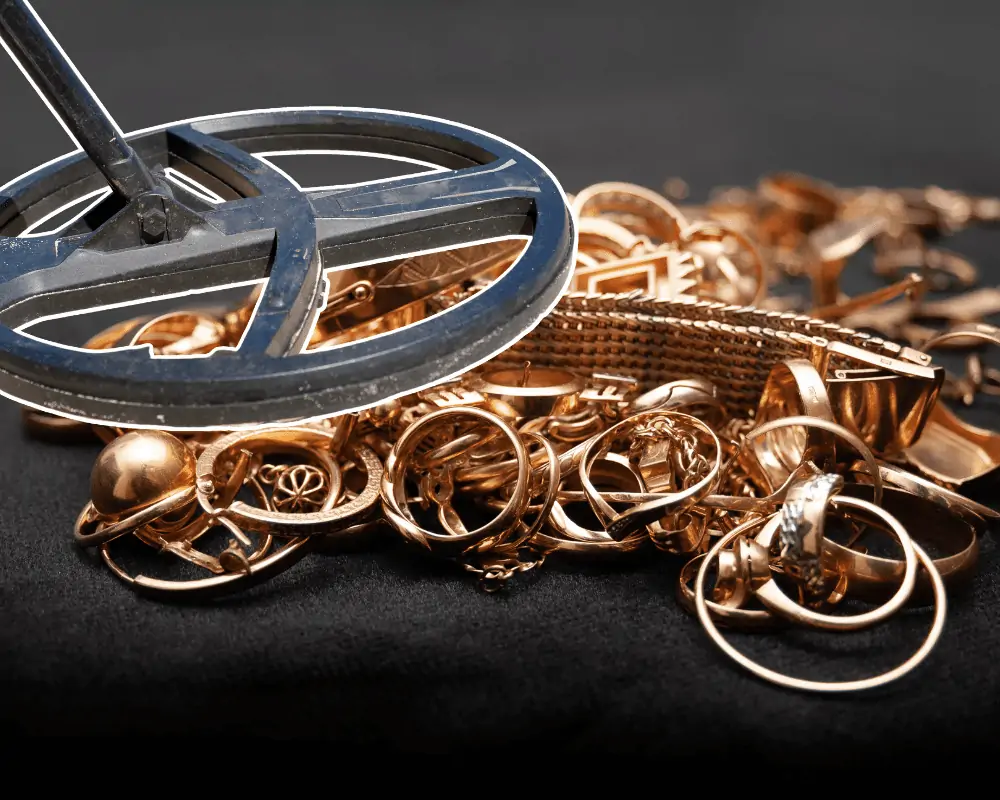
This type of gold is not as valuable as other types because such a small amount of gold is present. In fact, the gold layer is often only a few microns thick.
The gold plating process gives a piece of jewelry a gold appearance without the cost of pure gold.
Gold Karat Scale
No matter the karat of gold, your metal detector will find it in the ground. However, your metal detecting frequency may change with each lessening purity level.
Take some time to review the table below for a closer look at how pure each karat of gold is.

- 24 karats = 100% gold
- 22 karats = 91.67% gold
- 18 karats = 75% gold
- 14 karats = 58.33% gold
- 12 karats = 50% gold
- 10 karats = 41.67% gold
- 9 karats = 37.50% gold
How to Detect Gold Underground
Well, you’ve learned about the metal detectors, and you’ve learned about the gold.
How about we combine that and teach you how to detect gold underground?
Honestly, I’d recommend returning to my beginner’s guide on metal detecting because digging for gold is no different than any other metal.
But for simplicities sake, I’ll give you a quick rundown.
Once you’ve found a place to start metal detecting for gold, turn on your machine.

Now follow these steps for a proper gold detecting technique.
- Ground balance your metal detector.
- Set your metal detector to the ideal mode (all-metal, gold, etc.).
- Sweep your metal detector an inch or two above the ground, going left to right while keeping it level.
- Use a steady pace.
- When gold enters the magnetic field, your metal detector will respond with the appropriate sound or vibration.
- If the readings on your control panel indicate the target is gold, dig it up and enjoy.
What Number Is Gold on A Metal Detector?
A number is displayed when gold is detected if you have a visual target identification (VID) option on your metal detector.
Unfortunately, one size doesn’t fit all.

It’s best to get familiar with your metal detector manual, especially since different types of gold purity indicate a distinct number.
For instance, a yellow gold ring won’t produce the same VID as a gold nugget.
It all comes down to how good of an electrical conductor the metal identified is.
Not to mention, some metal detectors use a VID score between 0 and 99. At the same time, others might use a scale between -95 to +95.
Besides checking your manual, there are plenty of helpful resources online, like this forum entry discussing the gold VIDs for some of the more popular brands. I wish I could give you a more direct answer other than it depends.
How to Detect Gold Without a Metal Detector
You can detect gold without a metal detector if your metal detector stops working mid-hunt.
The most common way to detect gold without a metal detector is to try your hand at gold panning.

I cover this in more detail here.
But basically, gold panning uses a gold pan to sift through sentiment along waterways and areas close to high gold concentrations where small gold nuggets and flakes may have settled.
Another method is to dabble in a bit of rockhounding as many igneous rocks (volcanic) are known to contain elements of raw gold.

Either one of these methods requires some investigation into the environment’s history and topography to have any sort of success.
FAQs About Detecting Gold by A Metal Detector
There are plenty of questions about metal detecting for gold, so I’ll do my best to answer a few of them.
What Is the Difference Between a Gold Detector and Metal Detector?
The primary difference between a gold detector and metal detector is that a gold detector’s features are designed more specifically for finding gold in their natural environment.

While both can detect gold in the soil, a regular metal detector will feature a lower frequency and better discrimination, making them ideal for all metals, not just gold.
Can Metal Detectors Detect Gold Underwater?
There are many metal detectors capable of detecting gold underwater. But make sure you get a model that will meet your required depth.
Some underwater detectors can function at a high level, up to 10 feet in the water.
Others are built with the diving detectorist in mind and can detect gold at 200 feet below sea level.
The critical component for delivering underwater gold hunting success comes from the technology used during the manufacturing process.

Specifically, the care of following the international standards for ingress protection that allow a dust and water-tight frame.
More commonly referred to as an IP68 rating.
Signs of Gold in The Ground
The most obvious signs of gold in the ground are:
- Lighter shades of rocks.
- The presence of quartz.
- Rocks with iron staining.
- An area near known placer deposits.
Because of the way gold is distributed (volcanic eruptions and flowing water from source deposits), knowing the signs of gold is as simple as understanding the local petrologic history and topography.
So if it’s gold you’re looking for, do your research before setting out on a new adventure.
There’s Gold in Them There Hills!

Thanks for sticking it out with me. I know it’s a lot to take in, but every bit of information absorbed is a step closer to perfecting your craft.
Your metal detector has all the tools necessary to detect gold in the ground.
Some do it better than others, but now you know why.
So take the facts you’ve just learned and apply them to your metal detecting technique.
Use the right frequency, research the area’s history, and keep your eyes open for signs of gold in the ground.
Between digging up 24k gold and finding some long-lost gold plated jewelry, you can detect every treasure hidden below.
Until next time…



